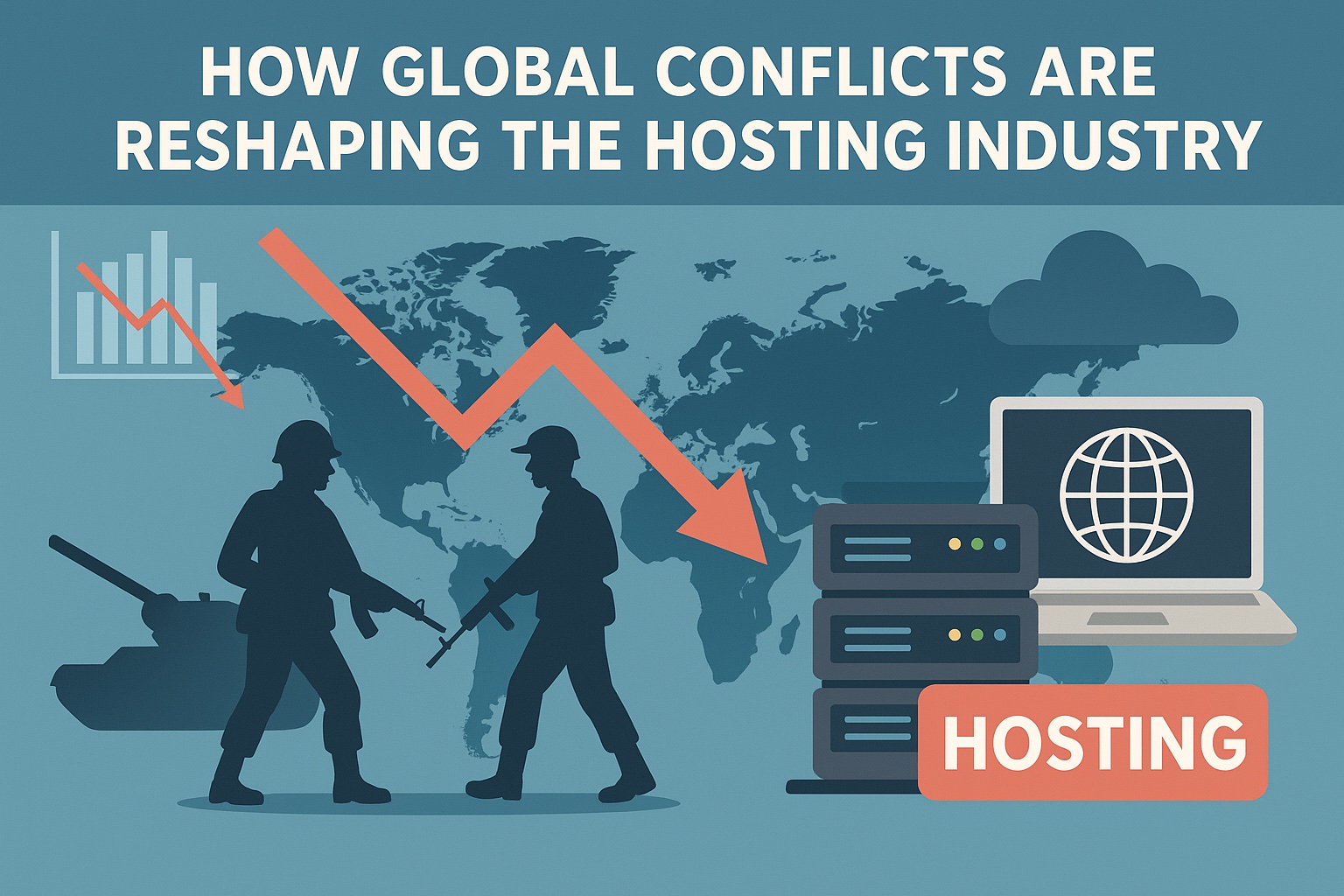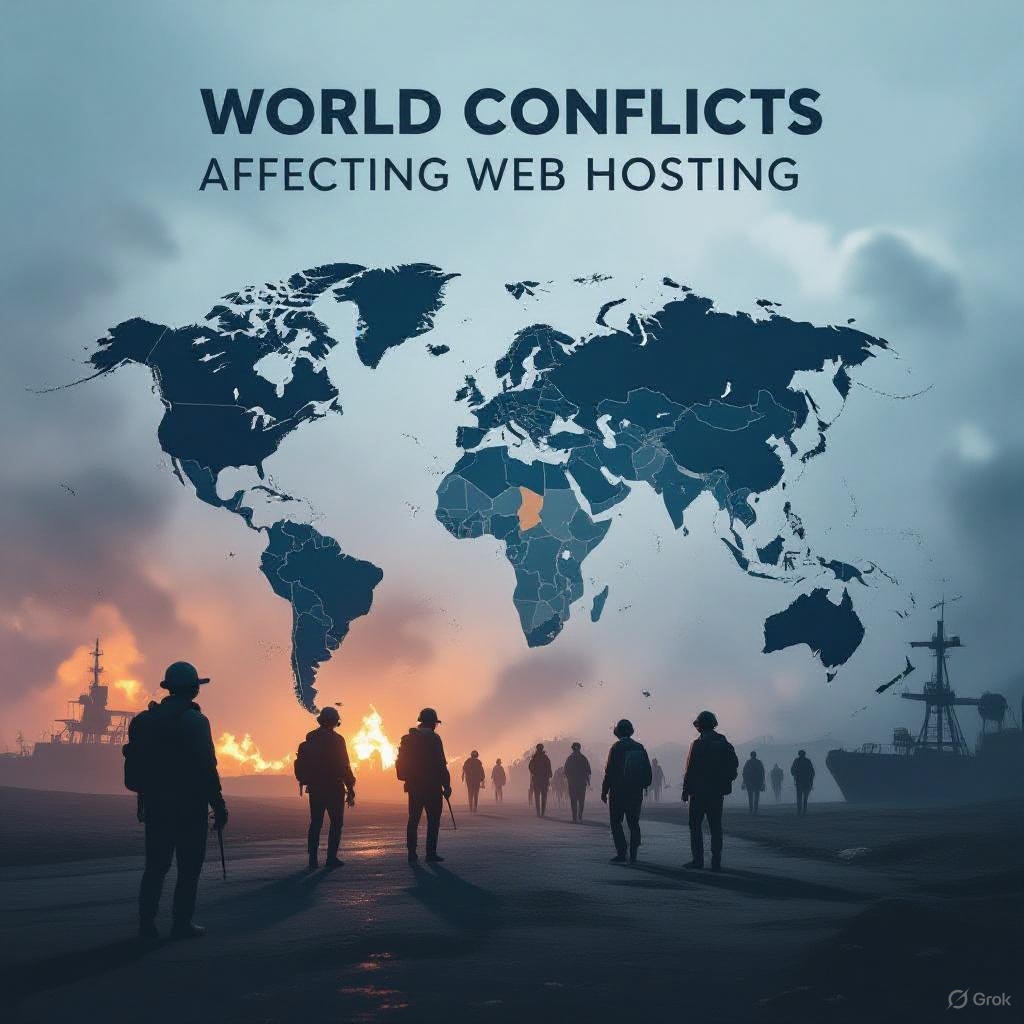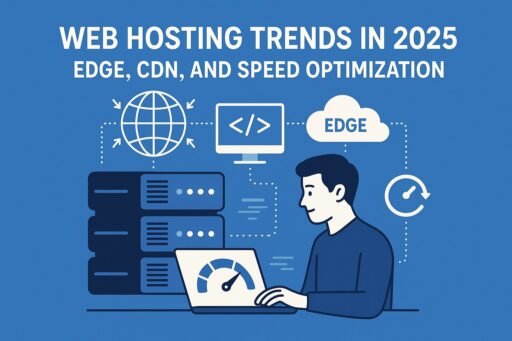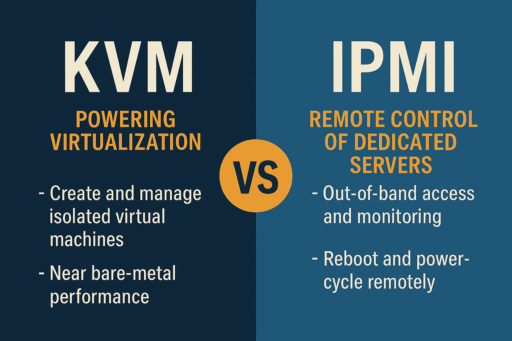In an increasingly interconnected world, the hosting industry—encompassing web hosting, cloud services, and data centers—has become a critical backbone for businesses, governments, and everyday digital life. However, ongoing global conflicts, from the Russia-Ukraine war to the Israel-Hamas conflict and escalating US-China tensions, are introducing unprecedented challenges and transformations.
These geopolitical upheavals are not just distant news headlines; they’re directly influencing supply chains, regulatory landscapes, cybersecurity postures, and even the physical locations of data infrastructure.
As we navigate 2025, understanding these impacts is essential for industry stakeholders. This article explores the multifaceted ways world conflicts are affecting the hosting sector and ProlimeHost.
Supply Chain Disruptions and Rising Costs
One of the most immediate effects of global conflicts on the hosting industry is the disruption of supply chains for essential hardware. Data centers rely heavily on components like servers, GPUs, and networking equipment, much of which is manufactured in regions prone to geopolitical tensions, such as China, Taiwan, and parts of Europe.
US tariffs, particularly those imposed under Section 301 and recent escalations reaching up to 145% on Chinese goods, have driven up costs for cloud infrastructure. These tariffs affect imports of critical electronics, leading major providers like AWS, Microsoft Azure, and Google Cloud to absorb initial cost increases, but smaller operators face steeper challenges, potentially raising prices for end-users or delaying expansions.
In response, companies are shifting manufacturing to tariff-exempt regions like Mexico and Canada under the USMCA, with Mexico poised for 20-30% growth in data center hardware exports this year. This relocation not only increases short-term capital expenditures but also risks broader trade wars, as seen in China’s retaliatory 34% tariffs on US imports.
It should be noted that the legality of recent US tariffs is under judicial review, with the White House appealing the lower courts ruling.
Broader supply chain vulnerabilities are exacerbated by conflicts. For instance, the Russia-Ukraine war has highlighted dependencies on global logistics, with sanctions forcing rerouting of shipments and contributing to delays in data center buildouts. Similarly, tensions in the Middle East could disrupt shipping routes through key chokepoints like the Strait of Hormuz, indirectly affecting hardware deliveries to data centers worldwide.
Data Sovereignty and Regulatory Shifts
Geopolitical conflicts are accelerating demands for data sovereignty, where governments insist on local control over data to protect national interests. This trend is reshaping how hosting providers operate, often requiring them to build region-specific infrastructure.
In the wake of the Russia-Ukraine conflict, Ukraine has amended laws to permit government data storage in international clouds for resilience, while Russia has tightened localization rules, mandating domestic processing and banning foreign databases for citizen data.
This regulatory fragmentation—now seen in over 100 measures across 40 countries—increases operational costs by up to 55% and complicates global strategies for providers. Enterprises are responding by repatriating data from public clouds to on-premises or private setups, driven by sovereignty concerns and fears of foreign government access under laws like the US CLOUD Act.
In Europe, US-China tensions and transatlantic disputes over data privacy are fueling “sovereign cloud” initiatives, where providers must ensure data stays within EU borders to avoid geopolitical leverage points. This has led to a surge in hybrid cloud adoption, balancing global scalability with local compliance, but it erodes the cost efficiencies that made public clouds attractive.
Heightened Cybersecurity Threats
Conflicts often spill over into the digital realm, with state-sponsored cyber attacks targeting critical infrastructure, including hosting services. The hosting industry, as a hub for vast data troves, is particularly vulnerable.
The Russia-Ukraine war has seen a 48% spike in cyber incidents in Ukraine, involving APT groups deploying malware against cloud-hosted systems and critical sectors like energy and telecom. These attacks exploit vulnerabilities in APIs and virtualization, extending risks to Western providers supporting Ukraine. Similarly, the Israel-Hamas conflict has amplified cyber threats, with DDoS attacks targeting Israel’s computer software industry (34% of incidents) and absorbing cybersecurity manpower through reservist call-ups. This not only strains operations but also heightens global risks, as conflicts weaponize digital dependencies.
Geopolitical targeting adds another layer: scenarios like government data seizures or sanctions could disrupt cloud access, prompting providers to enhance resilience through multi-region deployments and zero-trust architectures.
Market Dynamics and Infrastructure Relocation
The hosting market is undergoing a geopolitical redraw, with conflicts influencing where data centers are built and who dominates the space. Tariffs and trade tensions are shifting investments away from high-risk areas like Asia toward “friendly” regions.
For example, US policies are accelerating data center growth in North America, with exemptions boosting Mexico as a hub and potentially slowing Asian exports by 15-25%. The AI boom amplifies this, as conflicts over technology access (e.g., US export controls on chips to China) force providers to localize supply chains. In the Middle East, the Israel-Hamas war has indirectly benefited the industry by increasing reliance on cloud services for military and surveillance needs, with providers like Amazon, Google, and Microsoft deepening ties despite controversies.
However, these shifts come with hurdles: power shortages, sustainability concerns, and economic uncertainty from conflicts could delay projects, with 40% of businesses postponing cloud migrations due to trade tensions.
Case Studies: Real-World Impacts
- Russia-Ukraine War: Sanctions have led major CSPs (cloud service providers) to suspend Russian operations, reshaping market access and boosting sovereign cloud demand.
- Israel-Hamas Conflict: Manpower shortages from reservists and cyber attacks are straining Israeli tech firms, a key player in global hosting innovation.
- US-China Tensions: Tariffs are fragmenting supply chains, prompting a “gold rush” in alternative data center locations while hindering global collaboration.
Looking Ahead: Strategies for Resilience
As conflicts persist, the hosting industry must prioritize geopolitically informed strategies. This includes diversifying supply chains, investing in sovereign-compliant infrastructure, and bolstering cybersecurity. Hybrid models offer flexibility, while AI-driven risk assessments can help predict disruptions. Ultimately, while these challenges pose risks, they also drive innovation, potentially leading to a more robust, decentralized global hosting ecosystem.
ProlimeHost, a global web hosting provider specializing in dedicated servers, GPU servers, and VPS solutions, has positioned itself to navigate the challenges posed by global conflicts in the hosting industry through a combination of infrastructure resilience, cybersecurity fortifications, and strategic geographic diversification.
Our operational framework addresses key pain points such as supply chain vulnerabilities, heightened cyber threats, data sovereignty concerns, and infrastructure disruptions. Below, I’ll break down our preparations.
Geographic Diversification and Infrastructure Resilience
Global conflicts often disrupt physical infrastructure and supply chains, as seen with trade tariffs and logistics rerouting. ProlimeHost mitigates this by operating data centers in multiple stable regions: Los Angeles, Dallas, New York, Utah (all in the US), and Singapore. This spread reduces dependency on any single location, allowing for failover and continuity if one area faces conflict-related issues, such as power grid attacks or regional sanctions.
Our infrastructure emphasizes redundancy:
- Power and Network Redundancy: N+1 power setups, dual grid utility feeds, and multi-100Gbps Tier-1 connectivity from carriers like Level3, NTT, Zayo, Telia, and China Unicom ensure fault-tolerance. This is crucial for handling disruptions from conflicts, like those affecting energy supplies in Europe or Asia.
- Uptime Guarantee: A 99.99% network uptime SLA, backed by four-hour hardware replacement and IPMI for remote management, supports business continuity.
- China-Optimized Routes: Specialized low-latency connections for Asia-Pacific users address potential US-China trade frictions, which have imposed tariffs up to 145% on electronics and slowed hardware imports. By optimizing routes from Los Angeles, we minimize packet loss and jitter, helping clients bypass some geopolitical bandwidth constraints.
Hardware from reliable vendors like Dell, Cisco, VMware, and Netapp further bolsters supply chain resilience.
Enhanced Cybersecurity Measures
Conflicts frequently escalate cyber threats, with state actors targeting hosting providers (e.g., a 48% spike in Ukraine-related incidents). ProlimeHost prepares through proactive security protocols:
- Server Hardening and Firewalls: We offer server hardening, CSF/LFD firewall configurations for brute-force detection and SYN flood protection, and Mod Security rulesets to counter SQL injections and malware.
- Encryption and Threat Scanning: Recommendations include TLS encryption for all traffic, regular patching, and tools like Emsisoft Anti-Malware and Rkhunter for rootkit detection. Our blog highlights the need for these amid advancing cyber-criminal attacks in 2025.
- DDoS Protection and Compliance: Built-in DDoS mitigation, multiple security channels to prevent breaches, and tailored compliance for standards like HIPAA and PCI-DSS. This is vital for sectors vulnerable to conflict-spillover attacks, such as those seen in Israel-Hamas cyber escalations.
- Managed Services: Fully managed options include real-time monitoring, updates, and troubleshooting, with 24/7 expert support to respond swiftly to threats.
User reviews praise their reliability, with one noting a “world-class experience” and constant readiness to help, underscoring practical resilience.
Data Sovereignty and Regulatory Adaptability
Rising data localization laws from conflicts (e.g., Russia’s mandates post-Ukraine invasion) push for sovereign clouds. Our multi-region setup allows clients to select data centers based on regulatory needs. Our customizable configurations and compliance support enable adaptation to varying global regulations, reducing risks from cross-border data access laws like the US CLOUD Act.
Overall Strategy and Limitations
ProlimeHost’s approach leans on enterprise-grade and client-focused customization to foster long-term stability. By avoiding budget pitfalls like unreliable hardware—which could exacerbate conflict-driven shortages—we emphasize premium leasing with scalable upgrades.
In this volatile era, staying agile isn’t just an option—it’s a necessity for survival in the hosting world.
ProlimeHost is well-prepared through redundant, secure, and diversified operations, making it resilient to the hosting industry’s geopolitical headwinds. For tailored advice, contact our sales team at sa***@*********st.com or reach out to us at 1(877) 477-9454.







